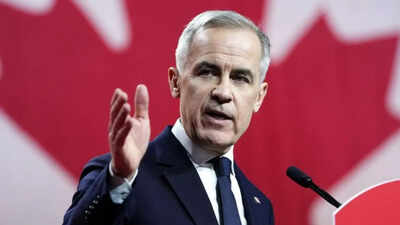Carney's Debate Performance Fuels Tensions in Quebec Politics

In a recent analysis of the political landscape in Canada, Quebec's leading newspaper, Le Journal de Montral, headlined its coverage with the striking remark, "Carney survives the debate in French." This commentary emerged from a recent debate among four candidates where Mark Carney, the former governor of the Bank of Canada, participated. Despite the headline suggesting a survival, the newspaper graded Carney's performance a notably low D+, indicating considerable struggles with the French language. This grade was by far the lowest awarded among the candidates, suggesting that while he may have held his own in the debate, his language skills could be a significant barrier in a province where French is the dominant language.
The significance of this debate extends far beyond just linguistic abilities; it highlights the complex dynamics of Canadian politics, particularly regarding the pivotal roles played by Ontario and Quebec in federal elections. Analysts often assert that Ontario, home to the largest population and possessing 36 percent of the parliamentary seats, is the key battleground that largely determines the outcome of federal elections. A party's performance in Ontario can make or break its chances of success across the nation. However, Quebec holds a crucial 23 percent share of the seats in Parliament and serves as the deciding factor for whether a party can secure a majority, allowing it to govern without reliance on smaller parties.
This intricate interplay of provincial and national politics has led to an increasingly heated atmosphere among candidates. Yves-Franois Blanchet, the leader of the Bloc Qubcois, has recently expressed his frustration as he witnessed his previous lead in the polls diminish in favor of Carney. During a news conference, Blanchet openly questioned Carney's commitment to Quebec, provocatively stating, in English, that Carney seemingly does not care about the province. "He will never say that he doesnt like us," Blanchet remarked, reflecting on the tension between the Bloc and Carneys campaign. "But I dont feel the love." This sentiment encapsulates the underlying emotional currents that often shape Quebec's political landscape.
In Thrse-De Blainville, an electoral district situated just north of Montreal, Marie-Nolle Closson Duquette is vying to take over from a retiring incumbent as the Blocs candidate. Last fall, when it was announced that she would be the nominee, the Bloc was enjoying a significant lead in the polls. So much so, that some political observers began to refer to her informally as "Madame la dpute," or member of Parliament, highlighting the high expectations surrounding her candidacy at that time.
As the campaign continues to unfold, the interplay of language, regional loyalties, and party dynamics will undoubtedly play a critical role in shaping the outcome of the elections, particularly in the province of Quebec where identity and representation are of paramount importance.




























